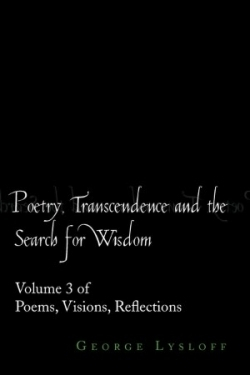Poetry, Transcendence, and the Search for Wisdom
Volume 3 of Poems, Visions, Reflections
In Poetry, Transcendence and the Search for Wisdom, a hybrid book of poetry and memoir, George Lysloff questions life after death, religion, and the cosmos. He acknowledges that his advancing age and the loss of family and friends, including his wife, spurs him to consider more closely the religious and philosophical beliefs that drive the world and him. In this third volume, readers get a direct line to the author’s daily struggles with his past and his uncertain future.
The Second World War had a profound effect on his early life. When he was a child, he and his family fled their home in France for a new life in Germany, before moving to the United States. Some of the book’s most successful passages are those that give readers a view into the difficult lives of Europeans during the war years. These passages possess rich emotions and details that many of Lysloff’s poems and meditations lack. One of the book’s primary pleasures is when the author pieces together episodes from his childhood.
Lysloff invites readers to muse with him over the power of memory, the mysteries of Hinduism, and the devastation he suffered as he lost his wife to dementia and then death. Lysloff rhapsodizes about his cat in more lighthearted moments, but the book does not attempt to be art or to capture some universal truth in the web of figurative language. Instead, the book represents a specific truth, an older man with a broad and keen intellect making sense of his past and considering the larger questions of his life.
The work is accessible and often sentimental, which may appeal to some readers, but sloppy proofreading will have others reaching for a red pen to correct typos. In addition, much of the work should have been edited for repetition. Some poems do the same work as the meditations. Multiple pieces address the loss of his wife, yet the point of view, the ultimate understanding, does not change; the mode of expression doesn’t change much either.
Lysloff is a retired psychiatrist and the author of more than a dozen books. He admits in his meditations, which tend toward the didactic, that the book is intended to share his thoughts with family and friends and perhaps other parties who wonder about life’s big questions.
This is an admirable, yet limited project. Yes, readers accrue a clear sense of this man, his thoughts, and how he spends his days. But, with poems that often embrace abstraction rather than detail and meditations that arrive at no new ground, the book isn’t much more than the journal of an intellectually curious man.
Reviewed by
Camille-Yvette Welsch
Disclosure: This article is not an endorsement, but a review. The publisher of this book provided free copies of the book and paid a small fee to have their book reviewed by a professional reviewer. Foreword Reviews and Clarion Reviews make no guarantee that the publisher will receive a positive review. Foreword Magazine, Inc. is disclosing this in accordance with the Federal Trade Commission’s 16 CFR, Part 255.

